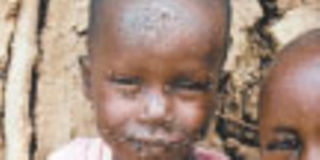Hygiene campaign on in war against blindness

A boy with flies all over his face at his home near the Maasai Mara. Narok is one of the regions that has remained trachoma endemic. Photo/PHOEBE OKALL
The old man stands forlornly, supporting himself with one of his traditional sticks.
From afar you might think he is peering at the horizon surveying his herd of cattle on the Naroosura plains of Narok South.
It is only when you get close to Mr Kimong’o Sankei, aged 72, that you can see his eyes are damaged and that he can no longer see.
Further down the Loita plains, little Ann Naserian, aged five, gropes helplessly trying to discover who are the other children playing nearby.
Mr Sankei and Ann are just two of the 6,000 people in Narok North and South who are blind because of an illness called trachoma.
Caused by dirt and flies, trachoma strikes when a bacterium called chlamydia trachomitis scars the membrane inside the eyelids, making the lashes turn inwards and rub the eye ball, causing a painful, blinding injury.
Recent surveys show trachoma has been on the decline in Kenya and the rest of the developing world in the past 25 years, yet Narok is one of the seven counties which have remained trachoma endemic in spite of massive health campaigns.
Others are Kajiado, Samburu, West Pokot, Turkana, Laikipia and Nyambene. An ancient disease now extinct in the developed world, trachoma remains the leading cause of avoidable blindness in developing countries.
Mr Todd Simpson, the coordinator for Africa programme at the Operation Eyesight Universal (OEU) says if unchecked, trachoma can hold back development in more ways than eyesight.
“To fully appreciate the effects of trachoma, it must be seen as hampering health, education and development. This calls for concerted efforts in checking its spread,” he said.
Mr Simpson is in charge of three other countries in Africa: Zambia, Rwanda and Uganda. OEU funds the campaign against trachoma in conjunction with the government of Kenya.
He said factors that can lead to an increased risk of trachoma include dirty faces in children, water scarcity, poor sanitation which promotes flies, lifestyle and culture.
The Maasai are known for their love for cattle and are known to live closely with their animals. But cow dung and spilt milk make the environment conducive for breeding of flies, said Mr John Sironka, coordinator of the Campaign Against Trachoma in Narok North.
He added that because the community is patriarchal, women were responsible for most of the household work and that they were therefore at a disproportionately higher risk of contracting trachoma than men.
Cultural beliefs about flies and riches were another factor which made the campaign against trachoma difficult, he said. The more flies one attracted, the more wealth one accumulated, was a myth that was widely believed.
“Besides the cultural issues, the trachoma problem in Narok is further compounded by frequent prolonged droughts which make water scarce, “ said Dr Michael Gichangi, the head of the division of Ophthalmology (eye services) at the Ministry of Public Health and Sanitation.
According to a 2009 survey on attitudes and practices relating to facial cleanliness and the improvement of environmental hygiene carried out in 88 manyattas in Narok, a majority of children did not wash their faces and those who did shared towels which spread the disease even further.
In order to check the spread of trachoma, measures aimed at eliminating factors that encouraged flies had been put in place.
“The strategy is to build 1,000 latrines — 500 in each of the two Narok districts — each year for the next five years,” said Mr Sironka.
He added that 200 had been completed with 65 working in the worst-hit divisions of Loita, Mara and Osupuko.
Dr Mukiri Mukuria of Narok North District Hospital said that this year alone, they had carried out 25 successful surgical operations in Loita division.
Indifference from trachoma patients was one of the biggest stumbling blocks to treatment. “In Talek area which borders the Maasai Mara, for instance, we have not done more than 10 operations since we started the campaigns more than 10 years ago,” Dr Mukuria said.




